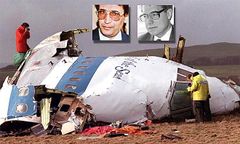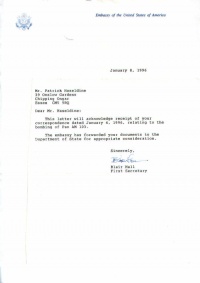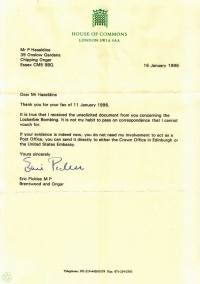Difference between revisions of "Eric Pickles"
m |
m |
||
| Line 13: | Line 13: | ||
|birth_place=Keighley, England, UK | |birth_place=Keighley, England, UK | ||
|political_parties=Conservative | |political_parties=Conservative | ||
| + | |description="He's a wily old fox" says Gerry Sutcliffe, Labour MP for Bradford South (1994–2015)<ref>''[https://www.theguardian.com/theguardian/2011/feb/12/eric-pickles-local-government-cuts "Eric Pickles: Public enemy number one?"]''</ref> | ||
|employment={{job | |employment={{job | ||
|title=Member of the House of Lords | |title=Member of the House of Lords | ||
Revision as of 16:10, 21 December 2023
(politician) | |||||||||||||||||||||||||||||||||||||||||||||||||||||||||||
|---|---|---|---|---|---|---|---|---|---|---|---|---|---|---|---|---|---|---|---|---|---|---|---|---|---|---|---|---|---|---|---|---|---|---|---|---|---|---|---|---|---|---|---|---|---|---|---|---|---|---|---|---|---|---|---|---|---|---|---|
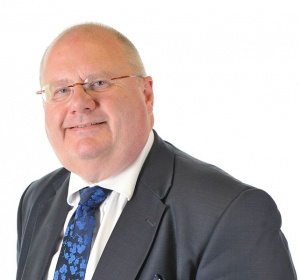 | |||||||||||||||||||||||||||||||||||||||||||||||||||||||||||
| Born | Eric Jack Pickles 20 April 1952 Keighley, England, UK | ||||||||||||||||||||||||||||||||||||||||||||||||||||||||||
| Alma mater | Leeds Metropolitan University | ||||||||||||||||||||||||||||||||||||||||||||||||||||||||||
| Spouse | Irene Coates | ||||||||||||||||||||||||||||||||||||||||||||||||||||||||||
| Member of | House of Lords/COVID-19 Committee, Transatlantic Institute/Friends of Israel | ||||||||||||||||||||||||||||||||||||||||||||||||||||||||||
| Party | Conservative | ||||||||||||||||||||||||||||||||||||||||||||||||||||||||||
"He's a wily old fox" says Gerry Sutcliffe, Labour MP for Bradford South (1994–2015)[1]
| |||||||||||||||||||||||||||||||||||||||||||||||||||||||||||
Eric Jack Pickles, Baron Pickles, is a British Conservative Party politician who was the Member of Parliament (MP) for Brentwood and Ongar from 1992 to 2017. David Cameron appointed him Secretary of State for Communities and Local Government from 2010 to 2015. He had previously been Chairman of the Conservative Party from 2009 to 2010.
In June 2015, Eric Pickles was "knighted for failing to build the homes we need"[2] and was appointed the UK Special Envoy for Post-Holocaust issues in September 2015. Eric Pickles stood down as an MP at the UK/2017 General Election, but continued in his role as Special Envoy under Prime Ministers Theresa May, Boris Johnson, Liz Truss and Rishi Sunak.
Lord Pickles is the chairman of Conservative Friends of Israel in the House of Lords.[3]
Contents
Early life
Born in Keighley, Yorkshire, Eric Pickles went to Greenhead Grammar School (which became Greenhead High School and is now University Academy Keighley) on Greenhead Road in Utley, north Keighley, then attended Leeds Polytechnic. He was born into a Labour Party supporting family – his great grandfather was one of the founders of the Independent Labour Party, and described himself as "massively inclined" towards communism as a boy[4] – but he joined the Conservative Party in 1968 after the Soviet Union invaded Czechoslovakia.[5]
Pickles soon became the chairman of the local Young Conservatives association and later became chairman of the national organisation.
Bradford councillor
Pickles was first elected to Bradford Council in 1979. Between 1988 and 1990, he was leader of the Conservative group on the council. In September 1988 the Conservative Party gained control by using the Conservative mayor's casting vote to become the only inner-city council to be controlled by the Conservatives.
When Bradford Council was hung, Pickles opted to break the agreement that the position of Lord Mayor is rotated between the parties, when he put a Conservative mayor in place again.[6] This effectively gave the Conservatives a majority due to the Lord Mayor's casting vote. To do this, they also broke the tradition that the Lord Mayor kept the status quo.
Whilst at Bradford, Pickles announced a five-year plan to cut the council's budget by £50m, reduce the workforce by a third, privatise services and undertake council departmental restructures, many of which proved controversial. "The Pickles Papers" by Tony Grogan, was written about this period in Pickles's life.[7]
Parliamentary career
In 1992, Eric Pickles was elected Member of Parliament for Brentwood and Ongar succeeding the Conservative chairman of the All-Party Parliamentary Aviation Committee (from 1980–92), Sir Robert McCrindle MP.
From February 1993 until May 1993, Pickles was Parliamentary Private Secretary to Tim Sainsbury MP, Minister for Industry.
From May 1993 until June 1997, Eric Pickles was appointed Vice-Chairman of the Conservative Party, with special responsibility for local government affairs.
In 1996, he was a Member of the Transport Select Committee. From July 1997 until August 1998, Eric Pickles was a Member of the Environment, Transport and Regional Affairs Select Committee, Chairman of the All Party Film Group, and Vice-Chairman of the Conservative Parliamentary Environment, Transport and The Regions Committee.
In August 1998, he was appointed Frontbench Social Security Spokesman. In December 2000, former BBC journalist Martin Bell announced he would stand against Eric Pickles in the 2001 General Election.[8] Having been re-elected, Eric Pickles was appointed Shadow Minister for Transport and Shadow Minister for London in September 2001. In June 2002, he was appointed Shadow Secretary of State for Local Government and the Regions.
Between August 2005 and July 2007 he was Deputy Chairman of the Conservative Party, before joining the Shadow Cabinet as Communities and Local Government Secretary.[9]
Lockerbie dossier
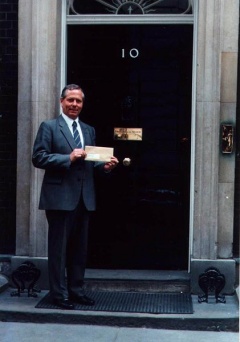
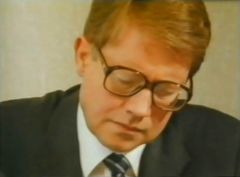
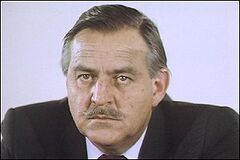
On 4 December 1995, Eric Pickles' constituent Patrick Haseldine delivered a letter headed "Lockerbie bombing: new evidence to confirm South Africa's involvement" to him at the House of Commons:
- Dear Mr Pickles,
- Foreign Office Minister Jeremy Hanley's letter dated 6th October 1995 stated: "until the trial of the two accused Libyans (Abdelbaset al-Megrahi and Lamin Khalifah Fhimah), the Lockerbie case remains open and the Crown Office evaluates all new evidence."
- There are four pieces of factual evidence I have assembled connecting the State Security Council of the apartheid South African régime with the Lockerbie bombing. I would have preferred to present that evidence to an independent public inquiry into the disaster but, unfortunately, Mr Hanley's letter also says: "there can be no question of a public inquiry because this would prejudice the outcome of the eventual trial."
- I am therefore entrusting you with the new evidence and would be grateful if you would forward it on my behalf to the Crown Office in Edinburgh without delay.
- As a former desk officer in the Foreign Office responsible for enforcing the mandatory UN arms embargo against the apartheid régime, I must be better qualified than most to pin the label "terrorist state" on South Africa. I did this in a letter that was published in The Guardian newspaper on 7th December 1988, exactly a fortnight before the Lockerbie bombing. The following month I heard that UN Commissioner for Namibia, Bernt Carlsson, was one of the 259 passengers who died on Pan Am Flight 103. Among the mourners at Mr Carlsson's memorial service in Stockholm on 11th January 1989 was South Africa's former Foreign Minister, Pik Botha. In a radio interview, Mr Botha revealed that he had been booked on the fatal flight but had transferred to another one. Mr Botha theorised that if he was the intended target of the Lockerbie bombing, then the ANC must have been the terrorists responsible for it.
- I was unconvinced by Mr Botha's theory and started to construct my own: that Bernt Carlsson was in fact the intended target and that "terrorist" South Africa was responsible for the bombing. I aired those initial suspicions to my MP (then Sir Robert McCrindle) and spoke about them to a number of media people and politicians. My theory on Lockerbie was mentioned at disciplinary hearings in the FCO - resulting in my dismissal by the Foreign Secretary John Major in August 1989 - as well as in a series of letters both to The Guardian and to the Scottish Lord Advocate. Copies of those two series of letters are enclosed. What my theory lacked then was factual evidence.
- It has taken nearly seven years to assemble that evidence. I am now confident the evidence confirms South Africa's involvement in a conspiracy to murder Bernt Carlsson but not necessarily that the apartheid régime actually planted the bomb (although I still believe they did it). That is to say, the South Africans must have known well in advance about a specific threat against Pan Am 103, in order to cancel the reservations for former Foreign Minister Pik Botha, former Defence Minister Magnus Malan and former Chief Director of Military Intelligence Major-General C J Van Tonder. Of the three, only Pik Botha travelled to New York via Pan Am Flight 101 (eight hours earlier than flight 103). The others returned to South Africa. It is my contention that they enticed Bernt Carlsson - who otherwise would have travelled direct from Brussels to New York - to come to London on a pretext concerning Namibia and with the comforting reassurance that he would travel onwards in the company of the two South African Ministers.
- In the event, Bernt Carlsson was nervous in discovering he was the only VIP on Pan Am Flight 103. But, in spite of his apprehension, he had to take that flight on 21st December 1988 so as to arrive in time for the signing of the Namibia Independence Agreement at the UN in New York the following day.
Four pieces of new evidence
- The four pieces of new evidence supporting my theory are as follows:
- 1. The murder indictment against the former Defence Minister of South Africa, General Magnus Malan, and the other members of the State Security Council including the former Chief Director of Military Operations, Major-General C J Van Tonder. They are all due for trial in the Durban Supreme Court on 4th March 1996 (see attached very recent correspondence between me and Director Reg Crewe of the South African National Crime Investigation Service);
- 2. Extract and transcript from the video "The Maltese Double Cross" in which we are told by the narrator that Pik Botha, General Malan and General Van Tonder were booked on the Lockerbie flight 103 but cancelled just before departure. This could not have been a last-minute cancellation since Pik Botha was booked on flight Pan Am 101 which departed Heathrow some eight hours before Pan Am 103;
- 3. Three articles in the iDAG newspaper, published in Malmo, Sweden on 12th, 13th and 14th March 1990. Copies of those articles and the English translations are enclosed. They begin: "Under Pressure and Nervous before Death Crash" and are summarised thus:
- Bernt Carlsson, UN Commissioner for Namibia, had less than seven hours to live when at 11:06am on December 21, 1988 he arrived in London from Brussels on flight BA 391;
- Strictly speaking he was meant to fly directly from Brussels to New York in time for the historic signing of the Namibia Agreement the day after;
- But Bernt Carlsson could not make it. He had a meeting with a "pressurizer" from the South African diamond cartel, which was so secret that evidently not even Javier Perez de Cuellar, UN Secretary-General, knew anything about it;
- 4. An extract of the evidence on Thursday, 25th October 1990 from the Fatal Accident Inquiry into Lockerbie which deals with the security arrangements (an especially careful check of the interline baggage) on Pan Am Flight 101, the 11:00am flight on which Pik Botha was booked.
Supplementary indictment
- These four pieces of evidence point strongly towards a South African connection with Lockerbie. The UK prosecuting authorities may wish to file a supplementary indictment for the former State Security Council members to answer in the Durban Supreme Court on March 4th, 1996. Or, alternatively, consideration could be given to extraditing General Malan and Maj-Gen Van Tonder to stand trial in Scotland for conspiracy to murder Bernt Carlsson.
Brighton bombing connection
- As far as the evidence against the two Libyans is concerned (the fragment of printed circuit board from a Swiss MEBO timer and the thread of a shirt bought in Malta), this might be more appropriate to evidence discovered in the debris of the 1984 Grand Hotel bombing in Brighton than eight months after the Lockerbie bombing in the wooded wilderness of Scotland! At any rate, that is my humble opinion.[10]
- Yours sincerely,
- Patrick Haseldine
- (Former Diplomat)
Post-script
- PS. As previously, I am copying this correspondence to my MEP, Hugh Kerr, to the Shadow Foreign Secretary, Robin Cook, to the Editor-in-Chief of The Guardian, Peter Preston, and to my solicitor, Pamela Walsh of L Bingham & Co. This time, I am also sending a copy to Jan-Olof Bengtsson, the Swedish journalist who allowed me to use his iDAG articles in support of my Lockerbie theory. Hopefully, Mr Bengtsson will publicise the action that you are taking to bring the guilty in the Lockerbie case to trial.
Post Office
Eric Pickles wrote on 16 January 1996 in reply:
- Dear Mr Haseldine
- Thank you for your fax of 11 January 1996.
- It is true that I received the unsolicited document from you concerning the Lockerbie Bombing. It is not my habit to pass on correspondence that I cannot vouch for.
- If your evidence is indeed new, you do not need my involvement to act as a Post Office, you can send it directly to either the Crown Office in Edinburgh or the United States Embassy.
- Yours sincerely
- Eric Pickles MP
- Brentwood and Ongar
Brush off
On 22 January 1996, Patrick Haseldine wrote again following Eric Pickles' refusal to pass the Lockerbie dossier to the Lord Advocate for Scotland:
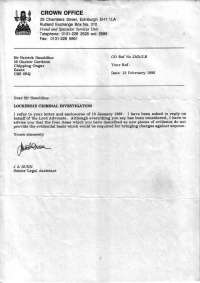
- Dear Mr Pickles,
- Thank you for your letter of 16th January 1996 declining my request made on 4th December 1995 for you to act as intermediary and present the new evidence to the Crown Office in Edinburgh. I sought your assistance primarily for security reasons but also because of your background knowledge of the case (my letter of 30th July 1995 refers).
- Nonetheless, and to save any further delay, I have already addressed the dossier to the Lord Advocate for Scotland and mailed it together with a letter dated 19th January 1996.
- The media will no doubt report the eventual outcome of this approach but if I hear of any interesting developments in the meantime I shall let you know.
- Yours sincerely,
- Patrick Haseldine
Another brush off came in a letter dated 13 February 1996 from the Crown Office:
- Dear Mr Haseldine
- Lockerbie criminal investigation
- I refer to your letter and enclosures of 19 January 1996. I have been asked to reply on behalf of the Lord Advocate.
- Although everything you say has been considered, I have to advise you the the four items which you have described as new pieces of evidence do not provide the evidential basis which would be required for bringing charges against anyone.
- Yours sincerely
- J A Dunn
- Senior Legal Assistant
Political appointments
Eric Pickles was Shadow Minister for Local Government from June 2002. Before that Pickles was Shadow Minister for Transport (September 2001 – June 2002) and Shadow Minister for London.
At the 2001 General Election, the independent candidate Martin Bell, who was the MP for Tatton, having run a campaign of "anti-sleeze", stood against Eric Pickles due to accusations that the Peniel Pentecostal Church had infiltrated the local Conservative branch.[11] Pickles' majority was severely reduced, but he retained his seat by a margin of 2,821 votes (6.5%) becoming elected with only 38% of the votes against Martin Bell's 31.5%.
At the 2005 General Election Pickles retained the seat with an increased majority of 11,612 (26.3%), nearly as many as the total votes cast for the second place candidate, and making this the second safest seat in Eastern England, and Pickles the MP with the third-highest share of the vote cast[12] in this region. Pickles polled a total of 23,609 votes (53.5%).
On 2 July 2007, Conservative leader David Cameron appointed Pickles to a reshuffled Shadow Cabinet as Shadow Communities and Local Government Secretary. On 30 December 2008, according to reports in The Times, Pickles unveiled plans to "purge town hall 'fat cats'". The Times reported that under the plans "dozens of council chiefs who earn more than Cabinet ministers would lose their jobs as clusters of councils merged their frontline services and backroom operations to provide better value for money."[13] Of the eight highest earning chief executives listed in The Times' report, six are employed by councils run by the Conservative party, one by Labour and one by the Liberal Democrats.
Pickles was the campaign manager for the successful Crewe and Nantwich by-election in May 2008. Following this, Pickles was promoted to Chairman of the Conservative Party in January 2009.
In early 2010, Pickles defended the first-past-the-post voting system as resulting in stable government. He attacked Prime Minister Gordon Brown saying he "...- now wants to fiddle the electoral system" by wanting to look at a proportional voting system with a single transferable vote.[14]
Secretary of State for Communities and Local Government
Pickles was appointed as Secretary of State for Communities and Local Government as part of David Cameron's new coalition Government on 12 May 2010,[15] and sworn as a Privy Counsellor on 13 May 2010.[16]
In his role as Secretary of State for Communities and Local Government, on 30 July 2010, Pickles announced plans to hand powers where ministers can cap unreasonable increases in council taxes to local people. A consultation begun in August 2010 and the powers, which will require legislation, should be in force by March 2012. Pickles said he was determined to reverse the presumption that Whitehall knows best by making local councils directly accountable to the local taxpayer. He said: "If councils want to increase council tax further, they will have to prove the case to the electorate. Let the people decide". Residents would be asked to choose between accepting the rise or rejecting it and instead accepting a below inflation rise, but with reduced council services. The average council tax on a Band D property increased from £688 a year in 1997/98 to £1,439 for 2010.[17]
Localism Act
Pickles was responsible for the Localism Act 2011 that changed the powers of local government in England. The measures affected by the Act include more directly elected mayors and referendums. The Localism Act opens with Part 1, Chapter 1(1), under the heading "Local authority’s general power of competence": everything which is not forbidden is allowed[18]
The Bill was introduced by Pickles, and given its first reading on 13 December 2010. The Bill completed the third reading in the House of Lords on 31 October 2011.[19] The Bill received Royal Assent on 15 November 2011.
The Bill was quickly undermined however, published on 13 December, one of the claims made for it is that it would "give local communities real control over housing and planning decisions". On the same day, Eric Pickles issued a decision in a planning appeal. National Grid had applied to Tewkesbury Borough Council to build a gas plant just outside Tirley in Gloucestershire. The installation would occupy more than 16 acres and was unlikely to be beautiful. The application had been opposed by more than 1,000 residents (and this in a sparsely populated rural area); by 12 parish councils and, indeed, by every single member of the planning committee of the local planning authority. Mr Pickles chose to grant permission to build the gas plant.[20]
Council prayers
On 10 February 2012, the National Secular Society obtained a High Court judicial review of the Christian prayers held during meetings in council chambers, that non-Christian councillors were forced to attend as prayers formed part of the formal agenda. Councillors are obliged to attend for the duration of the formal agenda. Mr Justice Ouseley ruled: "The saying of prayers as part of the formal meeting of a Council is not lawful under section 111 of the Local Government Act 1972, and there is no statutory power permitting the practice to continue. I do not think the 1972 Act should be interpreted as permitting the religious views of one group of councillors, however sincere or large in number, to exclude, or even to a modest extent, to impose burdens on or even to mark out those who do not share their views and do not wish to participate in their expression of them. They are all equally elected councillors".[21]
Although Mr Justice Ouseley said prayers were permitted to be held before the start of the formal agenda, Eric Pickles vowed to reverse the High Court decision, despite a recent Yougov poll showing 55% were against councils holding prayers with just 26% in favour.[22] Eric Pickles brought forward his Localism Act, due to become law in April 2012, and made it law on 17 February 2012 claiming he is 'effectively reversing' the High Court decision.[23]
Keith Porteous Wood, Executive Director of the National Secular Society, commented "A number of senior lawyers have expressed doubt whether the Localism Act will, as Mr Pickles hopes, make prayers lawful, and the Act was clearly not passed with that express intention. His powers to pass legislation are not, as he implies, untrammelled. Council prayers increasingly look set to become a battle between the Government and the courts at ever higher levels".[24]
The Localism Act permits local government councils to do anything that is not forbidden. Eric Pickles has written to all local government councils encouraging them continue with prayers in council meetings.[25]
Flags
Pickles is a self-proclaimed flag enthusiast,[26] and has taken a personal interest in ensuring that English County flags are regularly flown from the Department for Communities and Local Government.[27][28] He has urged people to fly the St George Cross of England more widely for St George’s Day and encouraged public bodies to adopt a common sense approach to flying the flag.[29] On 14 May 2011, at the Flag Institute Spring Meeting, Pickles announced a consultation aimed at "Making it easier for people to celebrate an identity or an organisation that means something to them."[30]
Second home
On 26 March 2009, Pickles appeared on the political debate programme BBC Question Time in Newcastle upon Tyne. While discussing the controversy over Tony McNulty (who had recently admitted claiming expenses on a second home, occupied by his parents, only 8 miles away from his primary residence), Pickles admitted he claimed a second home allowance because he lived 37 miles from Westminster and needed to leave his constituency house in Brentwood at 5:30am in order to get to Westminster for 9:30am,[31][32] given that he tended to get home at midnight or 1:00am, although the standard time for commuters from this region is usually ninety minutes.[33] He went on to say that it was "no fun" commuting into London from where he lived. In response to Pickles's comments that he "had to be there the House of Commons on time", Question Time host David Dimbleby, replied "Like a job, in other words?" prompting amusement amongst the audience.
There were also remarks from the audience about nurses and firemen etc. having to commute across London and get to their jobs on time and having to do without a second home.
Pickles was asked to pay back £300 following the MP's expenses scandal, which he had claimed for cleaning.[34]
Radio show
Eric Pickles also appeared as a radio presenter on local community radio station Phoenix FM together with the then Leader of Brentwood Council (and fellow Conservative) Brandon Lewis in a show titled The Eric and Brandon Show. The show was billed as non-party political, and involved the two politicians interviewing local personalities interspersed with music.
Personal life
Pickles married Irene Coates in 1976 in Staincliffe, a district of Batley in West Yorkshire.
External links
- Eric Pickles MP official constituency website
- Contributor page at The Guardian
- The Pickles Papers, Tony Grogan, 1989
- Eric Pickles news at publicservice.co.uk
- Video: "Eric Pickles' War Room Briefing: The challenge facing us at the next election" on the Webcameron YouTube channel.
Related Document
| Title | Type | Publication date | Author(s) | Description |
|---|---|---|---|---|
| Document:Israel Stooges Freak Out over Baroness Jenny's Remarks - Again | Article | 3 November 2018 | Stuart Littlewood | Baroness Jenny Tonge: "The Pittsburgh synagogue shooting was an absolutely appalling and a criminal act, but does it ever occur to Bibi and the present Israeli government that its actions against Palestinians may be reigniting anti-Semitism? I suppose someone will say that it is anti-Semitic to say so?" |
References
- ↑ "Eric Pickles: Public enemy number one?"
- ↑ "Arise Sir Eric Pickles, knighted for failing to build the homes we need"
- ↑ "Eric Pickles is Parliamentary Chairman (Lords) of the CFI"
- ↑ "Eric Pickles tells of communist past as Eric the Red"
- ↑ "Bluff diamond"
- ↑ "Eric Pickles: The Tory heavyweight"
- ↑ "The Pickles Papers" by Tony Grogan, 1989, ISBN 0-948994-04-5
- ↑ "Martin Bell to run for MP again"
- ↑ "Eric Pickles Biography"
- ↑ "The Iron Lady's Revenge"
- ↑ "Martin Bell to run for MP again"
- ↑ House of Commons Research Paper 05/33 – The General Election 2005
- ↑ "Tories plan purge of town hall ‘fat cats’"
- ↑ "Gordon Brown outlines plans to reform UK voting system"
- ↑ "The Rt Hon Eric Pickles MP"
- ↑ "Privy Council appointments, 13 May 2010"
- ↑ "Local people to get powers to veto excessive council tax rises, Eric Pickles to say today"
- ↑ "Localism Act 2011"
- ↑ "Localism Bill 2010–11"
- ↑ "Tirley, PRI Secretaries of State decision letter"
- ↑ "High Court Ruling on Council Prayers"
- ↑ "Yougov poll on Council Prayers"
- ↑ "BBC News on Council Prayers"
- ↑ "Keith Porteous Wood"
- ↑ "Prayer Advice"
- ↑ "Eric Pickles’ speech to the Flag Institute Spring Meeting" 14 May 2011
- ↑ "Flying the flag for Middlesex" Hillingdon & Uxbridge Times
- ↑ "Eric Pickles raises Essex flag above CLG"
- ↑ "Eric Pickles urges England to fly the flag for St George’s Day"
- ↑ "Flag consultation announcement"
- ↑ "MP: Long hours justify second home claim"
- ↑ "Tories should put Eric Pickles under house arrest"
- ↑ "Eric Pickles on Question Time, 1:35 on the video, 21 March 2009"
- ↑ "MPs' expenses: Who is in the clear, and who owes what"
Wikipedia is not affiliated with Wikispooks. Original page source here
